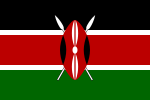Corruption in the government of Kenya has a history which spans the era of the founding president Jomo Kenyatta, to Daniel arap Moi's KANU, Mwai Kibaki's PNU governments. President Uhuru Kenyatta's Jubilee Party government, and the current William Ruto's Kenya Kwanza administration has also been riddled with massive cases of graft, topping in the list of corrupt Presidents in Africa [citation needed]
In Transparency International's 2023 Corruption Perceptions Index, Kenya scored 31 on a scale from 0 ("highly corrupt") to 100 ("very clean"). When ranked by score, Kenya ranked 126th among the 180 countries in the Index, where the country ranked first is perceived to have the most honest public sector.[1] For comparison with worldwide scores, the best score was 90 (ranked 1), and the worst score was 11 (ranked 180).[2] For comparison with regional scores, the average score among African countries [Note 1] was 33. The highest score in sub-Saharan Africa was 71 and the lowest score was 11.[3]
Most bribes paid by urban residents in Kenya are fairly small but large ones are also taken – bribes worth over KSh.50,000/= (€297.59, US$324.89) account for 41% of the total value. There is also corruption on a larger scale with each of the last two regimes being criticised for their involvement.[4]
Despite market reforms, several business surveys reveal that business corruption is still widespread and that companies frequently encounter demands for bribes and informal payments to 'get things done' in Kenya, a trend that has contributed to an increased cost of doing business in Kenya. The country ranks 56 among 190 economies globally on World Bank's Ease of Doing Business Index 2019.
The public procurement sector in Kenya suffers widespread corruption and is the leading form of graft in the public service and always at the centre of all major corruption scandals. The use of agents to facilitate business operations and transactions in Kenya is widespread and poses a risk for companies, particularly at the market entry and business start-up stage.[5]
Despite positive developments, the Kenya Anti-Corruption Commission (KACC) was disbanded and replaced by the newly instated Ethics and Anti-Corruption Commission (EACC) on 5 September 2011. Observers describe the new agency as superficial.[6]
It is observed that in Kenya bribery and nepotism as most prevalent forms of corruption according to surveys carried out.[7]
On 22 July 2019, Kenya's finance minister Henry Rotich became the country's first sitting minister to be arrested for corruption.[8] This followed an order by the Director of Public Prosecution (DPP), Noordin Haji, for the arrest and prosecution of Mr. Rotich and his Principal Secretary (PS) Kamau Thugge among other top government officials over the multibillion-shilling Arror and Kimwarer dams scandal.[9]
In 2017, the US government cut health funding to Kenya over widespread corruption in the Ministry of Health.[10] USAID suspended $21M funding for activities carried out by a number of the Ministry's departments over corruption and weak accounting procedures.[11]
- ^ "The ABCs of the CPI: How the Corruption Perceptions Index is calculated". Transparency.org. 20 December 2021. Retrieved 9 March 2023.
- ^ "Corruption Perceptions Index 2023: Kenya". Transparency.org. 30 January 2024. Retrieved 30 January 2024.
- ^ "CPI 2023 for Sub-Saharan Africa: Impunity for Corrupt Officials, Restricted Civic Space & Limited Access to Justice". Transparency.org. Retrieved 30 January 2024.
- ^ Transparency International. (2020). 2020 - CPI - Transparency.org. Corruption Perceptions Index 2020. https://www.transparency.org/en/cpi/2020/index/nzl
- ^ "Keny Corruption Profile". Business Anti-Corruption Portal. Archived from the original on 14 July 2015. Retrieved 14 July 2015.
- ^ "Kenya Corruption Profile". Business Anti-Corruption Portal. Archived from the original on 14 July 2015. Retrieved 14 July 2015.
- ^ OMBATI, CYRUS. "Bribery, nepotism most prevalent form of corruption in Counties- survey". The Standard. Retrieved 20 February 2020.
- ^ "Kenya's finance minister, top officials arrested for corruption". Al Jazeera. 22 July 2019. Retrieved 20 April 2020.
- ^ "How Ksh. 21 Billion vanished in Arror, Kimwarer dams scandal". Citizentv.co.ke. 28 February 2019. Retrieved 6 September 2020.
- ^ "US CUTS HEALTH FUNDING OVER CORRUPTION | KenyaForum". 10 May 2017. Retrieved 6 September 2020.
- ^ Murumba, Stellar (26 October 2016). "Revealed: Taxpayers lose Sh5bn in NYS-style Afya House theft". Business Daily. Retrieved 6 September 2020.
Cite error: There are <ref group=Note> tags on this page, but the references will not show without a {{reflist|group=Note}} template (see the help page).

